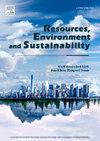Can the Resource Nexus guide improvements in urban planetary health? Insights from a literature review
IF 12.4
Q1 ENVIRONMENTAL SCIENCES
引用次数: 0
Abstract
Since 2007, cities have accommodated more than half of the global population. Their growth has led to significant environmental modifications and at least some degradation of the natural environment, with significant consumption of imported resources, waste generation and pollutant emissions. This on the one hand leads to a special importance of cities for planetary health, and on the other hand underlines the necessity of integrated approaches in environmental resources management for improving urban planetary health. However, the role of integrative approaches, such as the Resource Nexus, in urban planetary health remains insufficiently explored. This study addresses this gap by conducting a semi-systematic literature review, following the PRISMA guidelines to select and document the current state of knowledge on urban planetary health and the role of the Resource Nexus approach for sustainability transformations in this context. Based on 57 papers, a qualitative text analysis was conducted through the lens of the Resource Nexus framework. It was found that all key environmental resources are covered regarding their role for urban planetary health, with climate, food, biota, land, and water identified as the most critical elements for enhancing planetary health. Moreover, the analysed literature shows that despite the many challenges, urban areas offer a multitude of opportunities for societal, political, and economic interventions that can benefit environmental and human health. Maximizing synergies and minimizing trade-offs requires addressing both challenges and opportunities. This often involves making multiple changes at both the urban societal and governance levels. These changes create a systemic shift, moving away from prioritizing economic prosperity and towards a focus on planetary health.

资源联系能否指导城市地球健康的改善?来自文献综述的见解
自2007年以来,城市容纳了全球一半以上的人口。它们的增长导致了重大的环境变化,至少在一定程度上使自然环境退化,大量消耗进口资源,产生废物和排放污染物。这一方面使城市对地球健康具有特别的重要性,另一方面强调了在环境资源管理方面采取综合办法以改善城市地球健康的必要性。然而,诸如资源联系等综合办法在城市地球健康方面的作用仍未得到充分探索。本研究通过进行半系统的文献综述来解决这一差距,遵循PRISMA指南,选择和记录关于城市地球健康的知识现状以及资源联系方法在这一背景下对可持续性转型的作用。以57篇论文为基础,通过资源关联框架进行定性文本分析。研究发现,所有关键的环境资源都涉及到它们对城市地球健康的作用,其中气候、食物、生物群、土地和水被确定为增强地球健康的最关键因素。此外,经分析的文献表明,尽管存在许多挑战,但城市地区为有利于环境和人类健康的社会、政治和经济干预提供了大量机会。最大化协同效应和最小化权衡需要同时应对挑战和机遇。这通常涉及在城市、社会和治理层面进行多重变革。这些变化造成了系统性的转变,从优先考虑经济繁荣转向关注地球健康。
本文章由计算机程序翻译,如有差异,请以英文原文为准。
求助全文
约1分钟内获得全文
求助全文
来源期刊

Resources Environment and Sustainability
Environmental Science-Environmental Science (miscellaneous)
CiteScore
15.10
自引率
0.00%
发文量
41
审稿时长
33 days
 求助内容:
求助内容: 应助结果提醒方式:
应助结果提醒方式:


